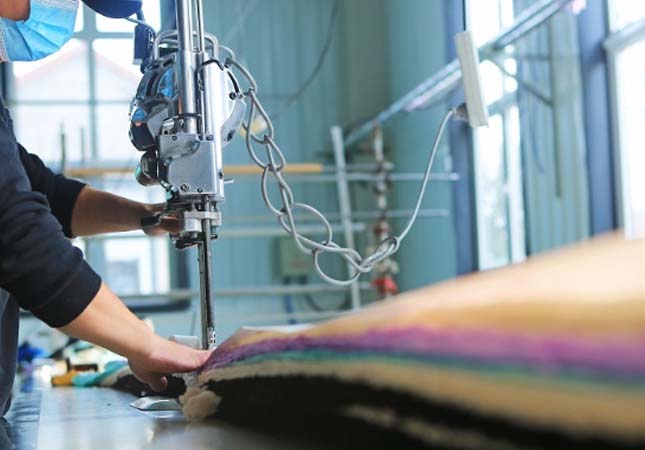The textile industry is undergoing a remarkable transformation as fashion companies increasingly embrace new technologies and textile machinery that were previously unconventional in the field. Karin Fleck, the CEO of Vienna Textile Lab, a company specializing in eco-friendly alternatives to conventional dyes, notes this noticeable trend. These advancements include the integration of biotechnology and electrochemistry into textile machinery and textile production processes, enabling responsible and environmentally conscious design practices.

As a result of this industry shift, fashion companies have begun to hire sustainability experts, bioengineers, and other professionals to foster in-house knowledge and establish new material supply chains. Interestingly, these hires are being made even before these innovative technologies are fully market-ready. By proactively investing in these areas, companies aim to position themselves at the forefront of the industry and cater to the escalating consumer demand for sustainable and innovative products.
This strategic approach not only enables companies to stay ahead of the curve but also empowers the textile industry to shape the future of the field. By adopting new technologies and sustainable practices, fashion companies contribute to the development of more environmentally friendly and socially responsible methods. This shift signifies a broader commitment within the industry to address the environmental and social impact of textile production.
The significance was emphasized because of these changes and highlighted the role of the textile industry in driving forward these eco-friendly practices. With the integration of biotechnology and electrochemistry, fashion companies have the opportunity to revolutionize their manufacturing processes, minimize their carbon footprint, and reduce their reliance on harmful chemicals.
The increasing use of biotechnology in textiles allows for the development of innovative and sustainable materials. This includes the creation of bio-based fabrics derived from natural sources such as algae or bacteria, which can be grown without depleting valuable resources or causing harm to the environment. Additionally, electrochemistry offers a range of possibilities for dyeing and finishing textiles without the need for conventional chemical processes, significantly reducing water usage and pollution.
By embracing these new technologies, fashion companies are not only aligning themselves with the growing consumer demand for sustainable products but also taking responsibility for the industry's environmental and social impact. The textile industry has the potential to set new standards for sustainable production and contribute to a greener future.
Overall, the adoption of biotechnology and electrochemistry in the textile industry signifies a transformative shift towards sustainable and innovative practices. By investing in these technologies and fostering in-house expertise, fashion companies aim to shape the future of the industry while meeting the evolving needs of environmentally conscious consumers. The collaborative efforts of industry leaders, sustainability experts, and bioengineers will undoubtedly contribute to the development of more responsible and socially impactful textile production methods.

The textile industry is experiencing a notable rise in diversity and complexity, primarily fueled by the changing demands of consumers. Today's consumers have become more inquisitive about the manufacturing processes and materials employed in the creation of products. As a result, the industry has witnessed a significant shift in focus towards sustainability, social welfare, and innovation.
The textile industry is a vast and interconnected ecosystem that encompasses various sectors, ranging from large-scale mass manufacturing to small family businesses. This diversity within the industry gives rise to distinct challenges and opportunities for all stakeholders involved.
The increasing curiosity of consumers has led to a heightened emphasis on transparency and responsible practices throughout the textile supply chain. People now want to understand the origins of the products they purchase, ensuring that they align with their values and contribute positively to society and the environment. This shift in consumer behavior has compelled manufacturers to rethink their processes, sourcing strategies, and labor practices, placing greater importance on ethical and sustainable considerations.
The textile industry's complexity lies in its intricate network of suppliers, manufacturers, designers, and retailers, all working together to bring products to the market. Collaboration and effective communication between these stakeholders have become crucial for achieving sustainable and innovative outcomes. By fostering a more interconnected approach, the industry can overcome challenges related to sourcing raw materials, implementing responsible production methods, and ensuring fair working conditions throughout the supply chain.
Moreover, the diverse range of businesses within the textile industry presents unique opportunities for growth and innovation. Small family businesses bring a distinct level of craftsmanship, heritage, and personalized touch to their products, appealing to consumers seeking unique and high-quality items. On the other hand, large-scale manufacturers have the resources and infrastructure to implement sustainable practices on a larger scale, driving systemic change within the industry.
In this evolving landscape, collaboration and knowledge sharing become essential tools for addressing the complexities and capitalizing on the opportunities present in the textile industry. By working together, industry stakeholders can navigate the challenges of sustainability, social welfare, and innovation, ensuring a more responsible and resilient future for the industry as a whole.




